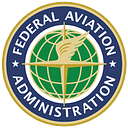Sarah Patten
Air Traffic Control Specialist, Potomac TRACON
by Paul Cianciolo, FAA Safety Briefing Associate Editor
Sarah Patten had never even considered a job as an air traffic controller — until the day she got hired. Her first foray into aviation as a pilot was on an impulse too.
“I thought flying a plane sounded fun, so I took an intro flight the summer before my senior year of high school,” explains Sarah. “Turns out it was fun, so I kept going back for more lessons.”
Now, a little more than 20 years later, she is still flying. Over the years, Sarah worked a few odd jobs around aviation whenever possible, including being a full-time flight instructor.
In 2008, the FAA started its “off-the-street” hiring of air traffic control specialists without any prior ATC experience. A mentor convinced Sarah that she should apply. She did.
“I’m so glad I took a chance and applied! The job has been so interesting, and I’ve had some incredible opportunities along the way,” she said.
Sarah now works at the Potomac Consolidated Terminal Radar Approach Control (TRACON), which provides air traffic control service to the Baltimore-Washington and the Richmond-Charlottesville areas. The facility also handles the Washington DC Special Flight Rules Area (SFRA), which means working with all general aviation (GA) aircraft that fly through this airspace.
“The increased security of the airspace can be a bit intimidating to pilots, but once you know how it works, it’s really not that scary,” Sarah observes.
To make it all even less scary, Potomac TRACON is in the planning stages for a spring 2020 version of Operation Raincheck. If you aren’t familiar with the term, Operation Raincheck allows pilots facilities so they can learn more about what happens on the other side of the microphone.
Sarah really wants pilots to know that it is not just okay, but essential, to clarify an instruction from ATC if it’s not understood. It’s safer to be on the same page rather than do something unexpected. Also, she advises that you should not keep secrets from ATC if you’re running into any sort of difficulty on a flight.
“If you’re getting low on fuel, you’re not quite sure where you are, the weather starts to deteriorate, or your engine suddenly starts running rough, just tell us,” she implores. “We have many resources available to help you get safely back on the ground. We can help you find nearby airports, better weather conditions, and move other aircraft out of your way in an emergency situation to name just a few.” Help is only a mic click away.
If you find yourself in the D.C. area airspace, you are likely to find Sarah either on the air or in the air. In her off duty time, Sarah is usually either flying her 1947 Cessna 120 or 1979 Cessna 172, or in the hangar building a Vans RV10.
Paul Cianciolo is an associate editor and the social media lead for FAA Safety Briefing. He is a U.S. Air Force veteran, and a rated aircrew member and volunteer public affairs officer with Civil Air Patrol.
